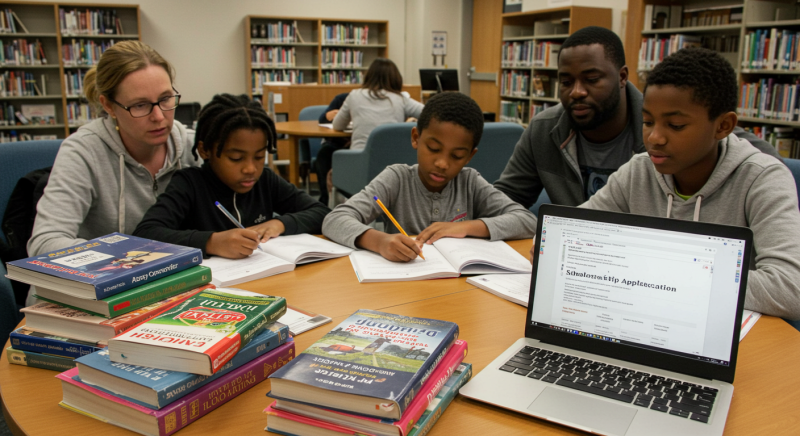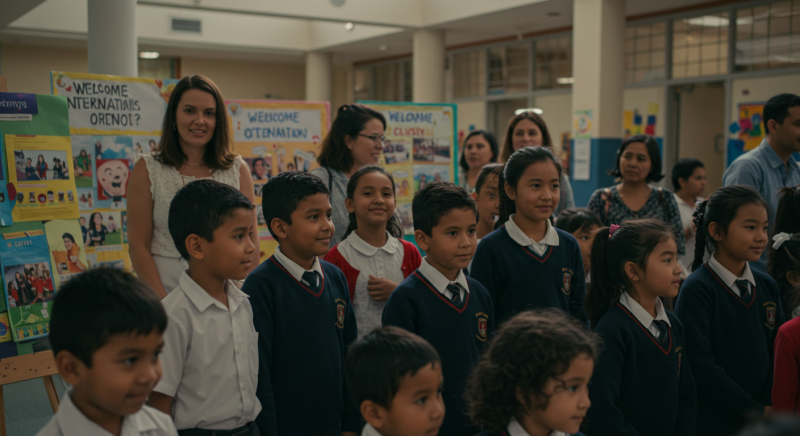“Education is the most powerful weapon which you can use to change the world, but it becomes even more meaningful when your family can share that journey with you.” – This quote captures the heart of many married students who dream of pursuing higher education abroad while keeping their loved ones close.
You’re a dedicated professional with big dreams of studying abroad, but there’s one major concern weighing on your mind. How can you pursue that master’s degree in international relations without leaving your spouse and children behind for months or even years? The good news is that studying abroad with family is not just a dream anymore – it’s a reality that thousands of married students achieve every year through targeted scholarships and fellowship programs.
When you think about international education, the conversation often focuses on single students with fewer responsibilities. However, the landscape has dramatically shifted, and many scholarship programs now recognize the unique needs of married students who want to study abroad with family members. These opportunities understand that your educational journey doesn’t have to mean separation from the people who matter most.
Key Takeaways
Before we dive deep into this comprehensive guide, here are the essential points you’ll discover about studying abroad with family through scholarship opportunities:
- Understanding how family-friendly scholarships work can transform your approach to international education. The most significant advantage is that you won’t have to choose between your career advancement and family stability. Many prestigious programs like the Rotary Peace Fellowship specifically accommodate family situations, providing additional support for housing, healthcare, and even educational expenses for children.
- Financial planning becomes more manageable when you know which scholarships cover family-related expenses beyond just tuition. Some programs provide stipends that account for the higher cost of living when supporting a family abroad, while others offer direct support for dependent healthcare and education.
- The application process for family-inclusive scholarships requires different documentation and planning compared to individual awards. You’ll need to demonstrate not just your academic merit, but also how your family’s presence will contribute positively to your studies and the host community.
- Timing your application becomes crucial when you’re coordinating visas, school enrollments for children, and career transitions for spouses. Starting your research at least 18 months before your intended start date gives you the best chance of securing comprehensive support.

Understanding Study Abroad With Family Programs
The concept of studying abroad with family has evolved significantly over the past decade. Traditional scholarship models assumed that students would relocate independently, but modern programs recognize that many qualified candidates are married professionals with children who cannot simply uproot their lives without comprehensive support.
When you study abroad with family, you’re entering a specialized category of international education that requires careful coordination between academic institutions, scholarship providers, and immigration authorities. These programs understand that your success as a student is directly connected to your family’s wellbeing and adaptation to the new environment.
The financial implications of relocating an entire family for education are substantial. Beyond tuition fees, you’re looking at international moving costs, temporary housing while you search for long-term accommodation, school fees for children, healthcare coverage for all family members, and the potential loss of your spouse’s income during the transition period. Scholarships that support families studying abroad address these comprehensive needs rather than just covering academic expenses.
Family-inclusive scholarships typically fall into several categories. Some programs provide a base scholarship for the student with additional allowances for each family member. Others offer comprehensive packages that include separate stipends for spousal support, child education allowances, and family healthcare coverage. Understanding these different approaches helps you identify which programs align best with your family’s specific needs.
The Rotary Peace Fellowship: A Premier Option for Families
The Rotary Peace Fellowship stands out as one of the most prestigious opportunities for professionals who want to study abroad with family. This fully-funded program supports individuals pursuing peace and conflict resolution studies while acknowledging the importance of family stability in academic success. You can find complete details about the program and application requirements at the official Rotary Peace Fellowship website.
What makes the Rotary Peace Fellowship particularly attractive for married students is its comprehensive support structure. The fellowship covers tuition, fees, room and board, and provides additional allowances that can accommodate family needs. While the program doesn’t explicitly provide separate family stipends, the living allowance is substantial enough to support dependents, especially when combined with careful budgeting and planning.
The fellowship offers both master’s degree programs at prestigious universities and professional development certificates. For families, the master’s degree option often provides more stability since it typically involves a longer stay (15-24 months) in one location, allowing children to settle into schools and spouses to potentially find employment or pursue their own educational opportunities.
Application for the Rotary Peace Fellowship requires demonstrating a commitment to peace and conflict resolution, which often appeals to professionals who want their family to experience international perspectives on global issues. The selection process is highly competitive, but successful candidates often highlight how their family experience and responsibilities have shaped their understanding of community building and conflict resolution.
When considering the Rotary Peace Fellowship for your family, it’s important to research the specific universities in the network. Some locations may offer better support systems for international families, including spouse employment opportunities, international schools for children, and established expatriate communities that can ease the transition.
Alternative Scholarship Programs Supporting Families
Beyond the Rotary Peace Fellowship, numerous other scholarship opportunities welcome applications from students who plan to study abroad with family. The Fulbright Program, while competitive, offers several family-friendly options including allowances for dependents and support for spouse employment authorization in certain countries. The Fulbright Scholar Program provides detailed information about bringing family members, with most awards having no restrictions on accompanying dependents.
Government grants and scholarships often provide additional support for married students, with some programs specifically designed to help families overcome financial barriers to education. The key is understanding how to present your family situation as a strength rather than a complication in your application materials.
Corporate scholarships increasingly recognize the value of supporting employees’ families during international assignments. Many multinational companies offer educational support programs that include family relocation assistance, understanding that investing in an employee’s family stability ultimately benefits the organization through increased loyalty and reduced turnover. The University of Adelaide’s Family Scholarship program exemplifies how institutions create specific support for international students with family connections, offering tuition reductions for students whose family members have studied at the university.
Professional association scholarships often provide excellent opportunities for studying abroad with family. Organizations in fields like healthcare, engineering, and education frequently offer grants that include family support components, recognizing that their members are often established professionals with family responsibilities.
Religious and cultural organization scholarships present another avenue worth exploring. Many faith-based organizations and cultural associations offer educational support that explicitly welcomes family participation, viewing international education as a way to strengthen community connections and cultural understanding.

Step-by-Step Application Strategy
Successfully securing a scholarship to study abroad with family requires a systematic approach that begins with thorough research and planning. Your first step involves creating a comprehensive list of programs that explicitly welcome or support family participation. This means going beyond surface-level research to understand the actual policies and support structures each program provides.
Document preparation becomes more complex when you’re applying to study abroad with family. You’ll need academic transcripts and test scores like any student, but you’ll also need to provide additional documentation including marriage certificates, birth certificates for children, and potentially spouse employment history or educational credentials. Some programs require detailed family financial statements to assess the additional support needed.
Your personal statement takes on added dimensions when family is involved. Rather than focusing solely on your individual academic and career goals, you need to articulate how studying abroad with family will benefit everyone involved. Discuss how exposure to international perspectives will enhance your children’s global awareness, how your spouse might benefit from international experience, and how your family’s presence will contribute to the diversity and richness of the program.
The financial planning component of your application requires careful calculation and presentation. You need to demonstrate that you understand the full cost implications of relocating a family and have realistic expectations about the scholarship support needed. This might involve researching costs of international schools, healthcare systems, and housing in your target destination.
Timeline management becomes critical when coordinating multiple visa applications, school admissions for children, and potential work authorization for spouses. Most successful applicants begin their process 18-24 months before their intended start date, allowing adequate time for the complex coordination required.
Financial Planning for Family Education Abroad
The financial landscape of studying abroad with family extends far beyond traditional student budgeting. While single students might manage on modest stipends, families face exponentially higher costs that require strategic planning and often multiple funding sources.
Housing costs represent the largest expense differential between individual and family study abroad experiences. Family-appropriate accommodation typically costs 2-3 times more than student housing, and you’ll often need to secure accommodation before arrival to ensure stability for children starting new schools. This might require significant upfront deposits and potentially higher monthly costs than scholarship stipends cover.
Healthcare coverage for international families can be complex and expensive. While many programs include health insurance for the scholarship recipient, family coverage often requires additional premiums or separate policies. Understanding the healthcare system in your destination country is crucial, especially if family members have ongoing medical needs or if you have young children who require regular pediatric care.
Educational expenses for children add another layer of complexity. Public school systems in some countries welcome international students at no cost, while others require substantial fees. International schools, while providing continuity in curriculum and language, can cost thousands of dollars per year per child. Some scholarship programs provide educational allowances for dependents, but many families need to budget independently for these costs.
Daily living expenses scale significantly with family size. Groceries, transportation, clothing, and entertainment costs multiply with each family member. Many successful families studying abroad establish detailed budgets that account for these scaled expenses while identifying areas where costs can be minimized through local adaptation and community integration.
Preparing Your Family for International Study
The preparation phase for studying abroad with family involves addressing both practical logistics and emotional readiness. Unlike individual study abroad experiences, family preparation requires coordination across multiple age groups and personality types, each with different needs and concerns about the international transition.
Language preparation often becomes a family affair when you’re planning to study abroad with family. While your program might be conducted in English, daily life in many countries requires at least basic proficiency in the local language. Involving your entire family in language learning creates shared excitement about the upcoming adventure while building practical skills that will enhance everyone’s experience.
Cultural preparation helps set realistic expectations and reduces culture shock for all family members. This involves researching not just academic culture, but also social norms, educational systems for children, and workplace cultures if your spouse plans to seek employment. Understanding cultural differences in parenting, social interaction, and community engagement helps your family integrate more successfully.
School research and preparation for children requires starting early and maintaining flexibility. International schools often have waiting lists, and public school enrollment procedures vary significantly between countries. Understanding the academic calendar, curriculum differences, and social integration support available helps you make informed decisions about your children’s education during your study period.
Your spouse’s preparation might involve career planning, educational opportunities, or volunteer work possibilities. Many countries have specific visa requirements for spouse employment, and understanding these regulations early helps set appropriate expectations and make necessary preparations.
Managing Family Logistics During Application
The logistics of applying to study abroad with family involve coordinating multiple timelines, documentation requirements, and approval processes. Unlike individual applications, family applications require synchronizing various elements that each have their own processing times and requirements.
Visa applications for families involve separate processes for each family member, often with different documentation requirements. Student visas, dependent visas, and potential work authorization for spouses each follow distinct procedures with varying processing times. Understanding these different pathways and their interdependencies helps you plan an appropriate timeline.
School applications for children often operate on different calendars than university admissions. While your graduate program might start in September, local schools might have different enrollment periods or waiting list procedures. Researching and initiating school applications early prevents last-minute complications that could disrupt your family’s transition.
Housing applications for families require different approaches than typical student accommodation. You’ll often need to work with local real estate agents, understand rental laws and deposit requirements, and potentially secure housing before arrival to ensure stability for your children. This process often requires significant upfront financial commitments.
Healthcare preparation involves understanding insurance requirements, finding family-friendly medical providers, and potentially arranging for medical record transfers. For families with ongoing medical needs, establishing care relationships before arrival ensures continuity and reduces stress during the transition.
Success Stories and Practical Examples
Real families have successfully navigated the process of studying abroad with family, and their experiences provide valuable insights for prospective applicants. The Fulbright Student Program Blog shares inspiring stories like that of a single mother who brought her nine-year-old daughter to Rwanda for thesis research, demonstrating that family situations often strengthen rather than complicate international study experiences. Sarah, a nurse from Lagos, secured a Rotary Peace Fellowship to study conflict resolution in Thailand. Her preparation involved enrolling her two children in Thai language classes six months before departure and connecting with expatriate family networks in Bangkok through online communities.
James and his wife Patricia represent another success story, where Patricia’s Fulbright scholarship to study public health in Canada became a family adventure. They budgeted carefully for their three children’s education, ultimately choosing public schools that welcomed international students while James pursued temporary work authorization to supplement their income.
The Martinez family demonstrates how creative funding combinations can support family study abroad experiences. Maria’s corporate scholarship covered her tuition for environmental engineering studies, while Diego’s remote work arrangement and the children’s enrollment in local public schools made their year in Germany financially feasible.
These success stories highlight common strategies including early planning, flexible budgeting, community engagement, and realistic expectation setting. Successful families often emphasize the importance of viewing challenges as opportunities for growth and maintaining open communication throughout the preparation and transition process.

Conclusion
Studying abroad with family represents an incredible opportunity for comprehensive international experience that benefits every family member. While the process involves additional complexity compared to individual study abroad programs, the rewards extend far beyond personal academic achievement to include enhanced global perspectives for children, international experience for spouses, and strengthened family bonds through shared adventure.
The key to success lies in thorough research, realistic planning, and flexible adaptation throughout the process. Programs like the Rotary Peace Fellowship demonstrate that prestigious international education opportunities are available for families, while the growing number of family-friendly scholarships indicates increasing recognition of married students’ needs.
Financial planning, cultural preparation, and logistical coordination require significant time investment, but families who approach these challenges systematically often discover that the process itself strengthens their problem-solving skills and family unity. The international experience provides children with invaluable global perspectives, offers spouses unique career or personal development opportunities, and creates family memories that last a lifetime.
As you consider your own family’s potential for international study, remember that thousands of families have successfully navigated this path before you. Their experiences demonstrate that with proper planning, realistic expectations, and commitment to the process, studying abroad with family can be one of the most rewarding experiences your family will ever share.
Frequently Asked Questions
Q: Can I really afford to study abroad with family on a scholarship? A: Yes, but it requires careful financial planning and often combining multiple funding sources. Programs like the Rotary Peace Fellowship provide substantial living allowances that can support families, especially when combined with budgeting strategies and potential spouse income. The key is realistic expense planning and understanding the full cost implications before committing.
Q: How do I handle my children’s education while studying abroad with family? A: Educational options vary by destination but typically include public schools (often free for international students), international schools (more expensive but curriculum continuity), or homeschooling options. Research your destination’s educational system early and consider factors like language of instruction, curriculum compatibility, and social integration opportunities.
Q: What if my spouse wants to work while we’re abroad? A: Spouse employment possibilities depend on visa regulations in your destination country. Some countries offer work authorization for dependents of students, while others restrict employment. Research these regulations early and consider how potential spouse income fits into your overall financial planning.
Q: How long does the application process take for family scholarships? A: Family scholarship applications typically require 12-18 months from initial research to program start. This extended timeline accounts for multiple visa applications, school enrollment for children, housing arrangements, and the coordination required between various family member needs.
Q: What happens if my scholarship doesn’t cover all family expenses? A: Most families combine scholarship funding with personal savings, spouse income (where permitted), and sometimes additional grants or loans. Create detailed budgets including contingency funds, and research local cost-saving strategies like public transportation, community programs, and family-friendly free activities.
Q: Is studying abroad with family worth the complexity? A: Families who have completed international study programs overwhelmingly report positive experiences despite the challenges. The international exposure benefits children’s development, strengthens family bonds through shared adventure, and provides unique global perspectives that last a lifetime. However, success requires realistic planning and commitment to navigating challenges together.
Read more 10 Grants for HealthCare Research in the UK
